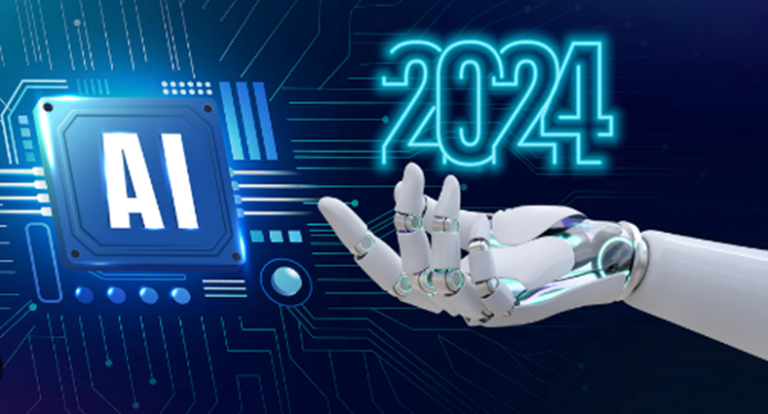AI and Healthcare: A New Era of Medical Innovation
In current time Artificial Intelligence (AI) is reforming or renovating healthcare meaningfully. AI is bringing various advancements and improvements for patient care. Here are some points that how AI is changing healthcare.

Enhanced Diagnostic Accuracy
AI analyzes medical images with precision. It detects anomalies early. AI assists radiologists in identifying diseases. This leads to accurate diagnoses.
Personalized Treatment Plans
AI tailor’s treatments for individual patients. It considers genetic factors. Personalized plans improve treatment effectiveness. This results in better outcomes.
Efficient Drug Discovery
AI accelerates drug development. It predicts drug efficacy. AI identifies potential side effects. This speeds up the discovery process.
Virtual Health Assistants
AI-powered assistants provide medical information. They answer patient queries. Virtual assistants offer health advice. This enhances patient engagement.
Remote Patient Monitoring
AI monitors patients remotely. It tracks vital signs continuously. Alerts are sent for abnormal readings. This ensures timely medical intervention.
Predictive Analytics
AI helps to predicts disease appearance. It goes through the previous health care data. Precise analytics supports in defensive measures. This controls disease spread.
Robotic Surgeries
AI-powered robots assist in surgeries. They perform precise movements. Robotic surgeries reduce recovery time. This improves surgical outcomes.
Healthcare Administration
AI optimizes administrative tasks. It schedules appointments efficiently. AI manages patient records securely. This streamlines healthcare operations.
Medical Research
AI analyzes vast datasets quickly. It identifies research trends. AI uncovers new medical insights. This advances medical research.
Telemedicine
AI enhances telemedicine services. It enables remote consultations. AI-powered tools diagnose conditions online. This expands access to healthcare.
Chronic Disease Management
AI manages chronic diseases effectively. It monitors patient health. AI provides personalized care plans. This improves quality of life.
Health Data Analysis
AI analyzes electronic health records. It identifies patterns in data. AI provides actionable insights. This supports clinical decision-making.
AI in Radiology
AI detects cancers in radiology scans. It improves detection rates. AI assists radiologists in image analysis. This enhances diagnostic accuracy.
Genomic Medicine
AI decodes genetic information. It identifies genetic disorders. AI helps in developing targeted therapies. This advances personalized medicine.
AI in Pathology
AI analyzes pathology slides. It detects disease markers. AI assists pathologists in diagnosis. This increases diagnostic precision.
Mental Health Support
AI gives mental well-being support. It offers therapy meetings. AI-powered chatbots do counseling of patients. This upgrades mental health care.
Wearable Health Devices
AI powers wearable health devices. They track fitness metrics. AI analyzes health data from wearables. This promotes healthy lifestyles.
AI in Oncology
AI identifies cancer types. It predicts tumor growth. AI suggests treatment options. This improves cancer care.
AI in Cardiology
AI monitors heart conditions. It predicts cardiac events. AI assists in treatment planning. This enhances cardiac care.
Patient Experience
AI personalizes patient interactions. It provides tailored health information. AI improves overall patient experience. This fosters patient satisfaction.
Clinical Trials
AI optimizes clinical trial processes. It identifies suitable participants. AI monitors trial progress. This speeds up clinical research.
AI in Ophthalmology
AI detects eye diseases. It analyzes retinal scans. AI assists ophthalmologists in diagnosis. This improves eye care.
AI in Dentistry
AI helps to examine dental images. It is helpful in prediction of oral health problems. AI supports dentists in treatment preparation. This improves dental care.
AI in Pediatrics
AI monitors child health. It predicts developmental issues. AI supports pediatricians in care planning. This improves pediatric care.
AI in Emergency Care
AI triages emergency cases. It prioritizes critical patients. AI assists in rapid diagnosis. This improves emergency response.
AI in Nutrition
AI provides personalized nutrition plans. It tracks dietary habits. AI suggests healthy food choices. This promotes better nutrition.
AI in Physical Therapy
AI designs rehabilitation programs. It monitors patient progress. AI adjusts therapy plans. This enhances physical therapy outcomes.
AI in Elderly Care
AI monitors elderly health. It predicts age-related issues. AI assists in care management. This improves elderly care.
AI in Infectious Diseases
It is helpful to track infection patterns. AI predicts how much disease spread. AI assists in meditation strategies. This manages infectious diseases.
AI in Dermatology
AI analyzes skin images. It detects skin conditions. AI assists dermatologists in diagnosis. This improves dermatological care.
AI in Surgery Planning
AI plans surgical procedures. It predicts surgical outcomes. AI optimizes surgical approaches. This enhances surgery planning.
AI in Rehabilitation
AI supports rehabilitation exercises. It monitors patient adherence. AI provides feedback on progress. This improves rehabilitation outcomes.
AI in Pain Management
AI examines pain patterns. It proposes help with relief strategies. AI aids in pain management suggestions. This improves pain care.
AI in Respiratory Care
AI monitors lung function. It predicts respiratory issues. AI assists in treatment planning. This improves respiratory care.
AI in Gastroenterology
AI analyzes digestive health. It predicts gastrointestinal issues. AI supports gastroenterologists in diagnosis. This enhances digestive care.
AI in Public Health
AI analyzes population health data. It predicts public health trends. AI supports health policy planning. This improves public health management.
AI in Immunology
AI examines immune reactions. It predicts immune system issues. Artificial intelligence helps with creating immunotherapies. This advances immunological consideration.
Conclusion
AI is transforming healthcare profoundly. It enhances diagnostic accuracy, personalizes treatments, and improves patient care. The future of healthcare is AI-driven, promising better health outcomes.
FAQ’s
How is AI improving diagnostic accuracy?
What role does AI play in personalized treatment plans?
How does AI accelerate drug discovery?
What is AI-powered virtual health assistants?
How does AI contribute to remote patient monitoring?
How does AI optimize healthcare administration?






